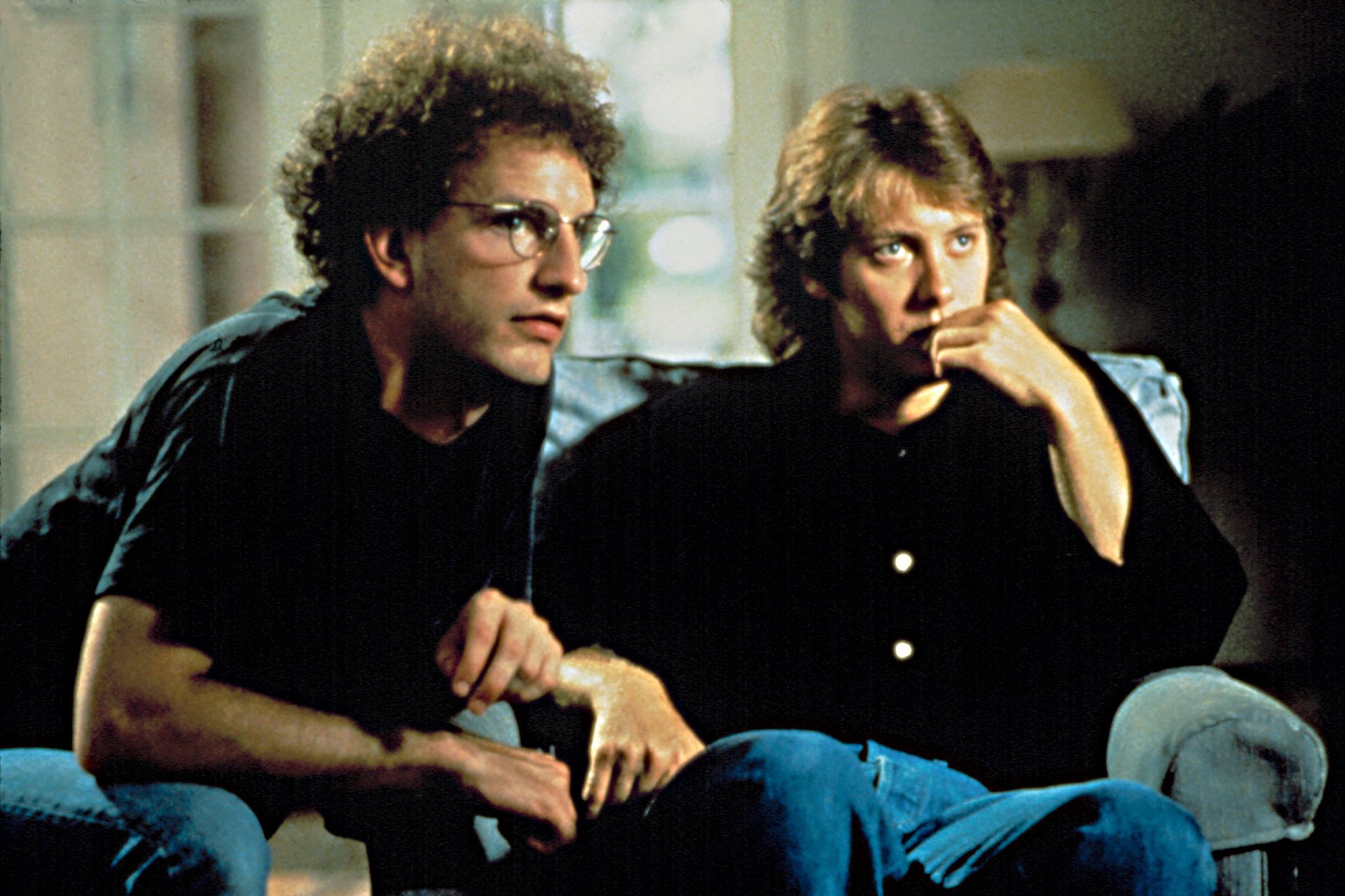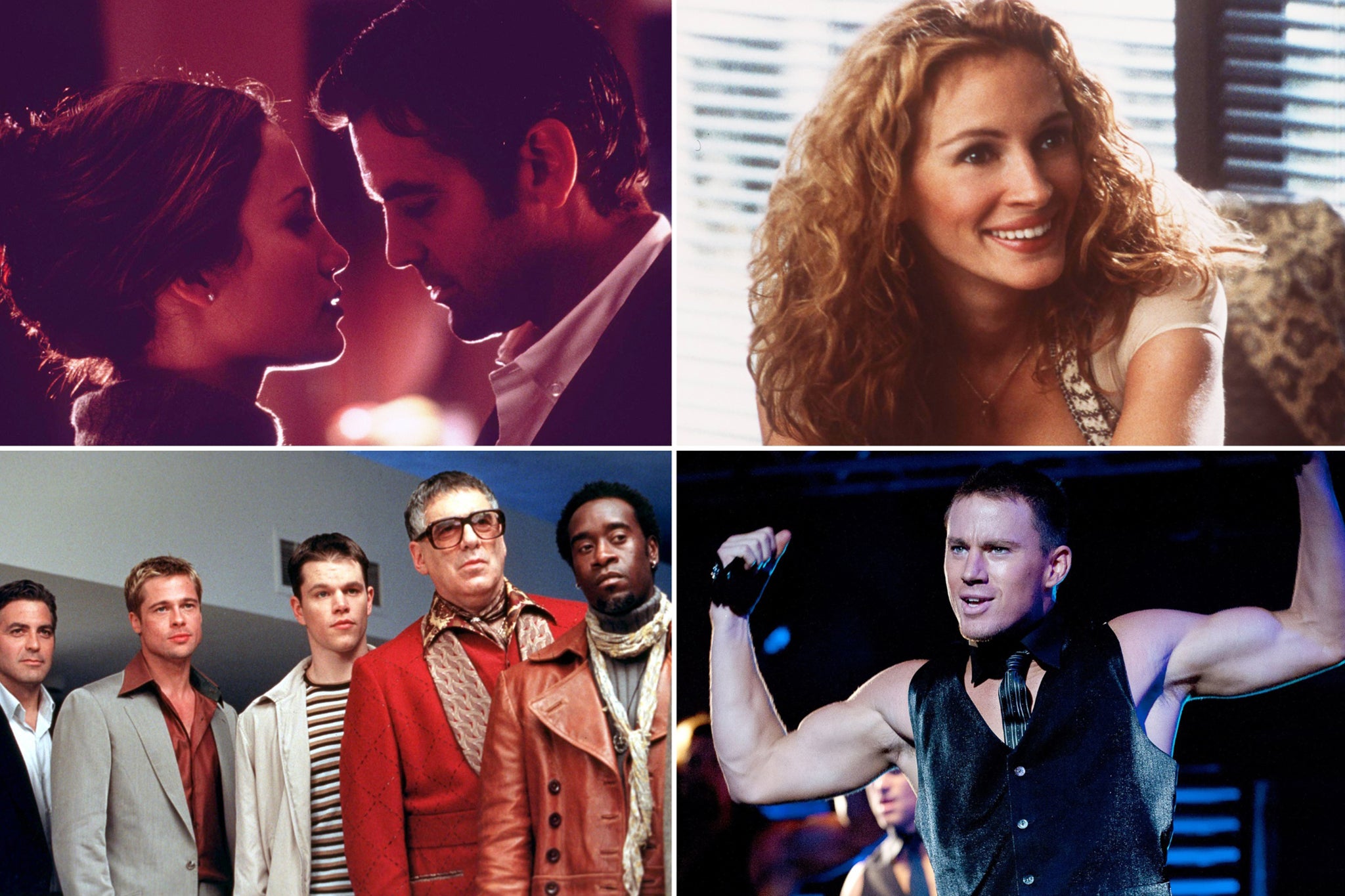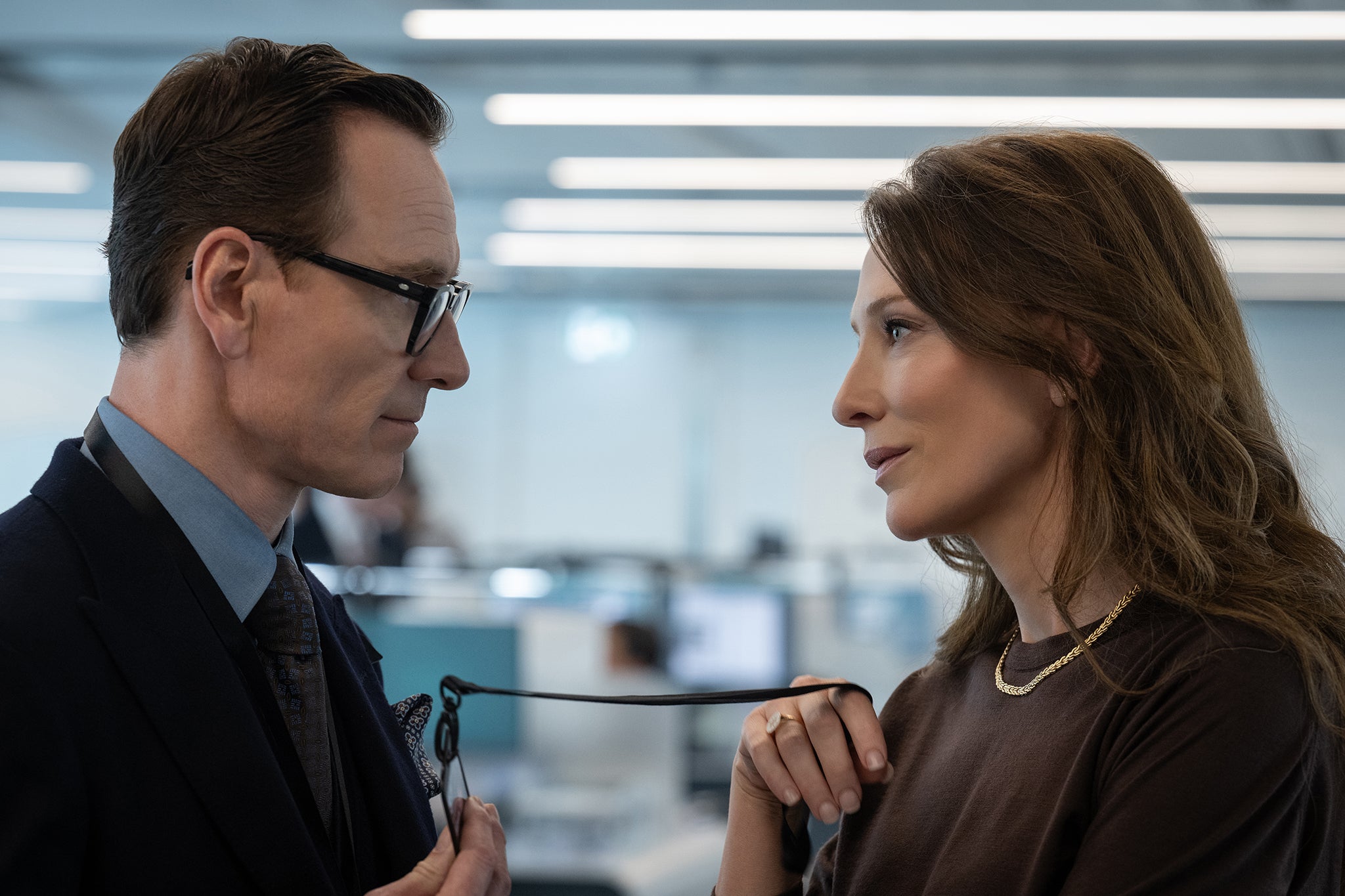
I don’t think audiences are even aware of who I am,” Steven Soderbergh tells me, with nary a hint of self-deprecation. And perhaps he’s right. Soderbergh has been making feature films for more than 35 years, and very famous ones at that, but it’s debatable whether the average person on the street could pick him out of a line-up. Many of the directors he came up alongside – Spike Lee, Quentin Tarantino, David Fincher, the Coen brothers – are now brands unto themselves. Soderbergh, with his slippery CV full of pop culture touchstones, strange tangents and admirable failures, is more of a question mark. Sex, Lies, and Videotape, Magic Mike, Ocean’s Eleven, Out of Sight? You know ’em. The man behind them? Likely not.
Since 1989’s Sex, Lies, and Videotape made him the youngest solo filmmaker to win the Palme D’or at the Cannes Film Festival (he was, to your probable horror, just 26), he has danced between roles in and outside of Hollywood. He’s been an Oscar darling (Traffic and Erin Brockovich both earned Best Picture nods in 2001, with Soderbergh taking home the Best Director prize for the former), a renegade experimentalist (Mosaic, a seven-hour murder mystery starring Sharon Stone, was released as an interactive mobile app in 2017), and cinema’s shortest-lived retiree (he flashily announced in 2013 that the Liberace biopic Behind the Candelabra would be his final film – he’s since directed 11 more.) But despite rebelling against expectations throughout his career, he’s also a realist. “Practically speaking,” the 62-year-old says, “if you make a lot of movies that people don’t go see, you don’t get to make a lot of movies. And right now I really need to think about what kinds of movies I’ll make going forward. I’m not interested in continually working on things where, if it comes up in conversation, people go… ‘oh, did that come out?’”
Soderbergh is in London, where he’s editing his new film The Christophers, a black comedy about art forgery starring Ian McKellen and Michaela Coel. If all goes to plan, it’ll be out later this year, making it the third Soderbergh film to be released within 12 months. Presence, a haunted house horror shot from the perspective of the ghost, arrived in January; Black Bag, a star-studded espionage thriller with Cate Blanchett, was released in March. Such a busy run would typically be cause for celebration, but the Soderbergh I meet today is anxious and slightly crestfallen. Despite sterling reviews (“immensely pleasurable,” went our critic Clarisse Loughrey; “it’s renewed my faith in modern cinema,” went Vulture’s Angelica Jade Bastién), Black Bag collapsed at the box office, and has grossed just $35m to date on a budget of at least $50m. Soderbergh, wearing thick black spectacles and dressed in a grey suit jacket over a fire alarm-red T-shirt, admits to being heartbroken.
“This is the kind of film I made my career on,” he explains. “And if a mid-level budget, star-driven movie can’t seem to get people over the age of 25 years old to come out to theatres – if that’s truly a dead zone – then that’s not a good thing for movies. What’s gonna happen to the person behind me who wants to make this kind of film?” Once the dust had settled on Black Bag’s opening weekend last month, its gross became a hot topic within the industry, he says. “I know for a fact, having talked to somebody who works at another studio, that the Monday after Black Bag opened, the conversation in the morning meeting was: ‘What does this mean when you can’t get a movie like this to perform?’. And that’s frustrating.”
Today, Soderbergh is promoting Black Bag’s home video release – it’s available on-demand now – not only because he believes in the film but because data has shown it’ll make the bulk of its money outside of cinemas. “Everybody at Focus Features [the film’s distributor] has assured me that ultimately Black Bag will be fine and will turn a profit,” he says, “but the bottom line is that we need to figure out a way to cultivate this audience for movies that are in this mid-range, that aren’t fantasy spectacles or low-budget horror movies.” He sighs. “They’re movies for grown-ups, and those can’t just go away.”
I’ve made a lot of things where people don’t see them when they come out, or they’re not happy with them when they come out, then time goes on and they’ve gone, like… oh, actually… People even like Ocean’s Twelve now!
Punctuating all of this is that Black Bag is Soderbergh’s best film in years. It’s a tight, twisty 90-minute thriller in which Blanchett and Michael Fassbender play married spies Kathryn and George, one of whom may be a traitor involved in the theft of a dangerous malware device. The plot unfurls during two heated dinner-party set pieces, the pair inviting a collection of vaguely untrustworthy guests (among them a magnificently sly secret agent played by Tom Burke and a shifty psychiatrist played by Naomie Harris) to spill their guts about the theft. Surveillance cameras are hacked. Lie detectors are deployed. Everyone is ludicrously beautiful and outfitted in expensive leather. It’s sexy, punchy, classic filmmaking. That few were convinced to leave their houses to actually see Black Bag feels depressingly significant.
That said, Soderbergh has been here before. Sex, Lies, and Videotape, a psychological drama about a married man who records women discussing their sex lives, was made for just over a million dollars and transformed the then-unknown freelance film editor into a superstar. But his follow-ups – the offbeat biopic Kafka and the treacly coming-of-age tale King of the Hill – were bombs, and Soderbergh spent much of the Nineties in a tailspin. He describes The Underneath, a confused 1995 thriller starring Peter Gallagher, as a “wake-up call”. The Underneath was traditionally told and directorially anonymous. He’s since called it “dead on arrival”. Moving forward, he’d emphasise sleek edits, chilly interiors and unconventional structures, albeit disguised by the presence of capital-M movie stars.

Out of Sight (1998), his post-fallow period breakthrough, starred George Clooney and Jennifer Lopez as a thief and an investigator entangled in a romantic cat-and-mouse game. It didn’t set the box office alight, but it earned enough industry goodwill to put him back on top. His subsequent run was creatively if not always commercially dizzying, though it contained some major box-office successes: the sharp and brutal Terence Stamp hitman movie The Limey (1999); ensemble drug tale Traffic (2000); the sunny legal drama Erin Brockovich (2000), which won Julia Roberts an Oscar; Ocean’s Eleven (2001); his elegant remake of Andrei Tarkovsky’s Solaris (2002); the divisive, self-referential caper Ocean’s Twelve (2004).
Few of them, he thinks, would exist today. “Erin Brockovich wouldn’t get made today; Traffic wouldn’t get made. Unless you get Timothée Chalamet who, god bless him, seems to be interested in doing different kinds of movies. But that window is getting smaller and smaller for filmmakers to climb through.”
Since the early 2010s, Soderbergh has primarily worked within genre film, following a bad experience on a two-part, nearly three-hour-long biopic about Che Guevara starring Benicio del Toro. “I watched people on that movie turn into zombies and roadkill because it was so stressful and physically difficult to get through,” he says with a rueful laugh. “It cured me of wanting to make anything that you could label as ‘important’.” He’d go on to make Magic Mike (2012), inspired by Channing Tatum’s brief time working as a stripper, along with the eerily prescient pandemic film Contagion (2011) that everyone went back to during Covid, the pulpy thriller Side Effects (2013) and the frothy comedy Logan Lucky (2017), starring Tatum, Adam Driver and Daniel Craig. “Genre films are the best and most efficient delivery system for any idea, because the audience shows up going, ‘Oh, I’m going to see a comedy, or a horror, or a thriller’, and you can pack it below the surface with all the things that you’re really interested in talking about. Everybody wins.”

This, though, has become trickier lately. Several of Soderbergh’s recent projects – notably the crime drama No Sudden Move starring Don Cheadle, Jon Hamm and Julia Fox – have flown under the radar, others you may not realise exist. One of my recent favourites of his was Let Them All Talk, a spiky comedy in which a novelist (Meryl Streep) sets sail on the Queen Mary 2 ocean liner with two friends she’s written about (Dianne Wiest and Candice Bergen). Released on the US streaming platform HBO Max in December 2020, it has – bizarrely – never come out in Britain. “This is one of the results of this weird world we live in now,” he says. “If you’re in the UK, you can’t see Let Them All Talk.” He says the explanation is boring – something about distribution deals between HBO and Sky – but that he is baffled by it. “They paid good money for a film that isn’t available to be seen in a market that seems really tailor made to see it,” he says, exasperated. “That doesn’t seem to me like a good business model.”
His hope, with Black Bag at least, is that people will discover it over time. “I’ve made a lot of things where people don’t see them when they come out, or they’re not happy with them when they come out, then time goes on and they’ve gone, like… oh, actually…” He smirks. “People even like Ocean’s Twelve now!” He thinks back to Out of Sight, which was by no means a big money-maker and briefly had many questioning whether Clooney and Lopez were going to make it as movie stars. “Very quickly it was looked upon kindly and imbued with the qualities of being a hit when it actually wasn’t a hit,” he remembers. “So maybe two years from now people will go, ‘Oh, Black Bag – that was a hit!”

Soderbergh has always had a healthy cynicism when it comes to the film industry, and has often talked about walking away from filmmaking entirely even after he returned to directing following his brief quasi-retirement. So it’s somewhat jarring to see him on the defensive today, and worried about whether there’s a space for him in the future, or the films he likes to make. “I’ve got a lot to think about,” he says, softly. “I think The Christophers is going to be fine, but after that… I can’t go make another movie whose target audience is the same as Black Bag’s. That’s just not an option.” He says he’s not angry, that the job of an artist is to adapt to the world around them, but that he has been destabilised. “I don’t need any more indie cred, you know what I mean?” he says. “I need to make things that people go see.”
After we say our goodbyes, I start to feel destabilised, too. If one of our greatest living filmmakers, who’s always seemed so cocksure about his vision, is suddenly feeling professionally adrift… well, it can’t be good for those of us who love movies.
‘Black Bag’ is available to rent and buy on digital platforms


.png?w=600)




